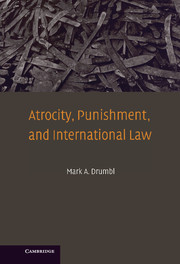Book contents
- Frontmatter
- Contents
- Preface and Acknowledgments
- List of Abbreviations
- Atrocity, Punishment, and International Law
- 1 Extraordinary Crime and Ordinary Punishment: An Overview
- 2 Conformity and Deviance
- 3 Punishment of International Crimes in International Criminal Tribunals
- 4 Punishment of International Crimes in National and Local Criminal Justice Institutions
- 5 Legal Mimicry
- 6 Quest for Purpose
- 7 From Law to Justice
- 8 Conclusion: Some Immediate Implications
- Notes
- Index
4 - Punishment of International Crimes in National and Local Criminal Justice Institutions
Published online by Cambridge University Press: 03 December 2009
- Frontmatter
- Contents
- Preface and Acknowledgments
- List of Abbreviations
- Atrocity, Punishment, and International Law
- 1 Extraordinary Crime and Ordinary Punishment: An Overview
- 2 Conformity and Deviance
- 3 Punishment of International Crimes in International Criminal Tribunals
- 4 Punishment of International Crimes in National and Local Criminal Justice Institutions
- 5 Legal Mimicry
- 6 Quest for Purpose
- 7 From Law to Justice
- 8 Conclusion: Some Immediate Implications
- Notes
- Index
Summary
National and local criminal justice institutions play a key role in sanctioning extraordinary international criminals. These institutions in fact undertake the bulk of the work. International institutions are designed to prosecute individuals alleged to bear the greatest responsibility for atrocity and, therefore, are intended to focus on leaders and organizers although, in practice, they do prosecute lower-level offenders (as was routinely the case in East Timor). For the most part, though, lower-level offenders – many of whom, like the Rwandan bulldozer driver Anastase Nkinamubanzi, killed many innocents in grisly fashion – remain in the hands of national and local institutions.
The scholarly literature on how domestic courts punish international crimes when they exercise national, territorial, or universal jurisdiction is limited. This is a notable lacuna insofar as the ICC formally defers to national courts as the front line of prosecution and punishment through the doctrine of complementarity. Moreover, the completion strategies of the ICTY and ICTR activate the referral of cases to national institutions (in the states of the former Yugoslavia or Rwanda, or the courts of any state). These referrals preserve the primacy of the ad hoc tribunals over national institutions, but lead to the reality that cases will be (and already are) processed at the national level.
Overall, and to varying degrees inter se, national and local criminal justice institutions tend to gloss over the conceptual differences between ordinary domestic crimes, on the one hand, and extraordinary international crimes, on the other.
- Type
- Chapter
- Information
- Atrocity, Punishment, and International Law , pp. 68 - 122Publisher: Cambridge University PressPrint publication year: 2007

